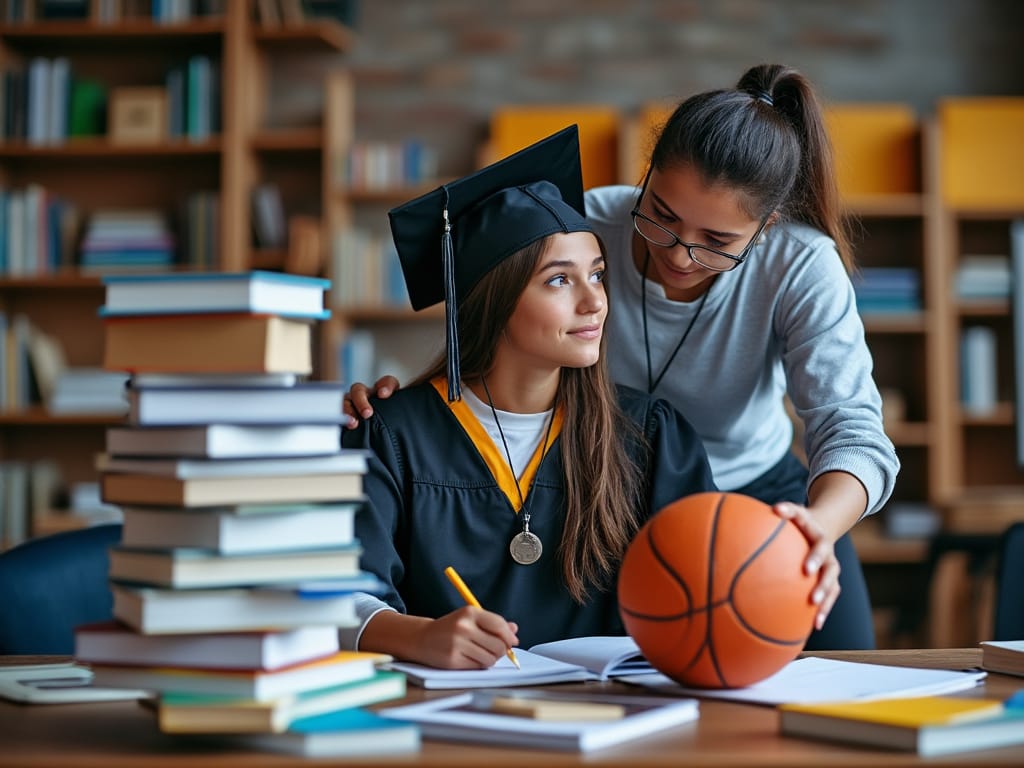Innovative, Research-Based Strategies to Help Student-Athletes Succeed Academically

Coaches and athletic directors play a critical role in shaping student-athletes not only on the field but also in the classroom. Many athletes face the challenge of balancing rigorous sports schedules with academic demands. Fortunately, research provides several innovative strategies that can help student-athletes thrive academically while continuing to excel in their sports.
1. Academic Coaching Programs
Academic coaching involves one-on-one meetings with a trained mentor to help athletes develop essential skills like time management, goal-setting, and self-monitoring. Research shows that athletes participating in academic coaching programs see significant improvements in their GPA, as it provides personalized strategies for managing both academic and athletic commitments.
- Research Basis: Studies show that academic coaching improves executive functioning skills and significantly boosts GPA. A 2017 study published in the Journal of Educational Psychology found academic coaching particularly effective when combined with peer mentorship.
- Example: Schools implementing academic coaching have seen measurable improvements in student-athlete performance, particularly when paired with consistent progress tracking.
2. Peer-Led Tutoring and Mentorship
Peer tutoring has proven to be particularly effective for student-athletes. By working with academically strong teammates or peers, athletes can reinforce their learning and stay accountable. A recent meta-analysis found that students involved in peer tutoring showed a 15% improvement in GPA, making it a valuable tool for those who need academic support.
- Research Basis: A meta-analysis published in the Review of Educational Research demonstrated that peer tutoring led to a 15% improvement in GPA and increased motivation among students.
- Example: Many athletic programs have implemented peer-led tutoring, leading to improvements in both academic performance and team cohesion, as student-athletes work together towards common goals.
3. Flipped Classrooms and Blended Learning
For athletes with demanding schedules, the flexibility of flipped classrooms and blended learning models is a game-changer. In this approach, students absorb content through videos or interactive lessons before class and then use class time for problem-solving. This model has been shown to increase student engagement and improve grades, as athletes can learn at their own pace and get more hands-on help during class.
- Research Basis: Research from the International Journal of Educational Technology shows that flipped classrooms increase student engagement and lead to higher academic achievement, especially for athletes managing packed schedules.
- Example: Schools with flipped classroom models have reported improved grades among student-athletes, as they can learn at their own pace while receiving targeted help during class.
4. Gamification of Learning
Athletes thrive on competition, and integrating game-based learning elements such as quizzes, competitions, and digital platforms can significantly boost academic motivation. Research indicates that gamified learning increases academic performance by up to 30%, particularly for students with a competitive mindset. This approach makes learning more engaging and fun for athletes.
- Research Basis: A study published in the British Journal of Educational Technology found that gamified learning improved academic performance by 30%, particularly for students with competitive mindsets like athletes.
- Example: Many educational platforms now incorporate gamification, where athletes earn rewards for completing academic challenges, which has led to increased engagement and better grades.
5. Mindfulness and Mental Health Interventions
Stress management is a key factor in academic success, and mindfulness techniques or mental health interventions can help athletes stay focused and calm. Studies show that athletes who practice mindfulness daily perform better in the classroom and on the field, as these techniques improve concentration and reduce anxiety.
- Research Basis: A 2019 study in the Journal of Educational Research found that student-athletes who practiced mindfulness showed significant improvements in academic performance and well-being, as mindfulness helps manage stress and enhance focus.
- Example: Some athletic departments have introduced daily mindfulness exercises, helping athletes reduce anxiety and improve concentration both in sports and academics.
6. Metacognitive Strategy Instruction
Teaching athletes how to think about their learning (metacognition) has proven to enhance academic success. By encouraging athletes to plan, monitor, and evaluate their study habits, coaches can help them take ownership of their learning process. Research suggests that students who use metacognitive strategies experience a 20% boost in academic performance.
- Research Basis: Research from the American Educational Research Journal found that students who used metacognitive strategies saw a 20% improvement in their academic performance, as they became more effective in managing their study time and habits.
- Example: Schools that offer metacognitive strategy instruction have seen athletes become more independent learners, improving both their grades and time management skills.
Supporting student-athletes academically is essential to their overall development. By implementing these innovative, research-based strategies—such as academic coaching, peer tutoring, gamified learning, and mindfulness—coaches and athletic directors can empower their athletes to succeed both in the classroom and on the field. With the right guidance, student-athletes can achieve excellence in all areas of their lives.
Bound for Greatness Podcast
Bound for Greatness is a podcast that addresses current issues facing athletic professionals and also offers leadership strategies for coaches and athletic administrators. Coach and athletic administrative veteran, Scott Garvis, tackles the issues facing education based activities from a unique perspective; sometimes irreverent, sometimes cynical, and sometimes serious. Scott covers current topics while also providing leadership lessons from his career as coach and administrator.


Lead More & Manage Less in your role as an Athletic Director with Bound – the ultimate platform designed to support and assist athletic administrators with software and services backed by experiences athletic leaders. Built by AD's Just like You, Bound revolutionizes athletic administration, streamlining tasks and unlocking more time for strategic leadership. Click on the button below to discover how Bound is transforming the game. Elevate your game with Bound!
